Educational technology is an often overlooked global phenomenon. In 2015, global EdTech companies took in more than $2.98 billion across 442 deals, and global EdTech funding jumped a whopping 58% in 2015 from the previous year. The global market is projected to grow at 17.0% per annum, to $252 billion by the year 2020. Asia is seeing the fastest growth in investment into the sector; China, in particular, is the largest EdTech market.
According to the Statistical Report on Internet Development in China, the number of online educational users in China reached 423 million as of March 2020, an increase of 110.2% from the end of 2018. The EdTech sector in China is estimated to reach RMB 453.8 billion in 2020, a 12.3% increase from the previous year, according to a report by iiMedia Research. As a response to the coronavirus outbreak, many EdTech start-ups have captured the opportunity to increase its presence in China and competed to gain popularity among students with attractive course offerings and discounts.
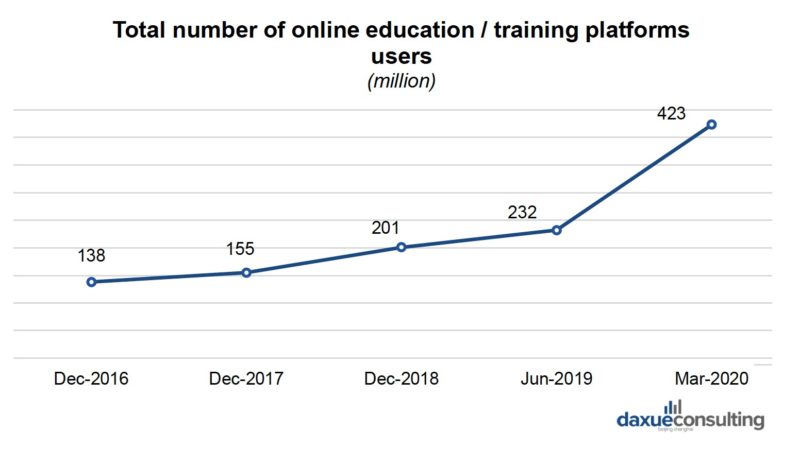
With over 400 million students, China is the world’s largest market for educational technology. While the education market in China still has much room to improve, especially in terms of formal integration of technology into classroom settings, many companies have successfully taken advantage of opportunities for digitizing education in China. EdTech landscape in China focuses on virtual tutoring, but there are a number of other EdTech start-ups that have successfully penetrated the EdTech landscape in China.
These are a few of the most innovative start-ups of the Chinese EdTech landscape – from robotics to tutoring, to innovative educational technologies. We also explore which of these start-ups have gained a competitive edge during the coronavirus outbreak.
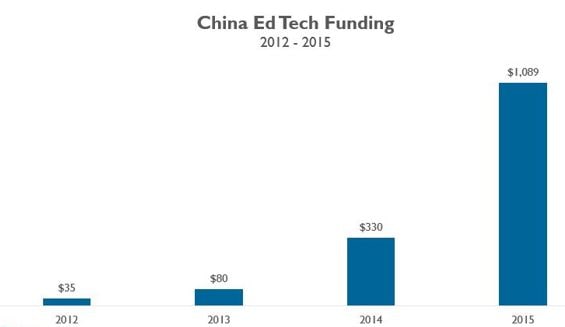
EdTech platforms in the Chinese education market
Yuanfudao (Yuantiku)
The platform focuses on K-12 learning and its products include AI-enabled virtual classes, live tutoring, and apps for homework support. A start-up founded in 2012, Yuanfudao has raised US$1 billion in a new round of funding in April as a response to the coronavirus outbreak led by Hillhouse Capital and its previous investor Tencent Holdings. This puts its valuation at around US$7.5 billion, making it one of the most valuable ed-tech start-ups in China.
In 2015, it launched Yuantiku, an online question bank. This app strategically takes advantage of the test-taking focus of the education system in China. Yuantiku is an online education product that provides material of previous years examinations for students and an exercise database that also provides tailored exercises to improve testing efficiency. Some tests available include: National College Entrance Exam, post-grad entrance exams, tests for civil servants, first-level constructor exams, law counselor of enterprise exams, securities qualification exams, and more. More than 13 million Chinese junior high and high school students utilize the app, where hundreds and thousands of apps are aggregated to prepare students for the college entrance exam.
With such a huge database like this, its no surprise that two-thirds of Yuantiku’s staff is dedicated to research and development. Leading engineers and researchers are also hired for the application’s “little ape” search and “ape teaching” assistance to further develop its artificial intelligence methods in more effective learning methods. However, since its release, there have been public debates regarding its promotion of the heavy test-centric culture that has already been criticized in China. Questions of whether this kind of application is positive for the social health for Chinese educational society is still something to keep in mind with Yuantiku.
17zuoye
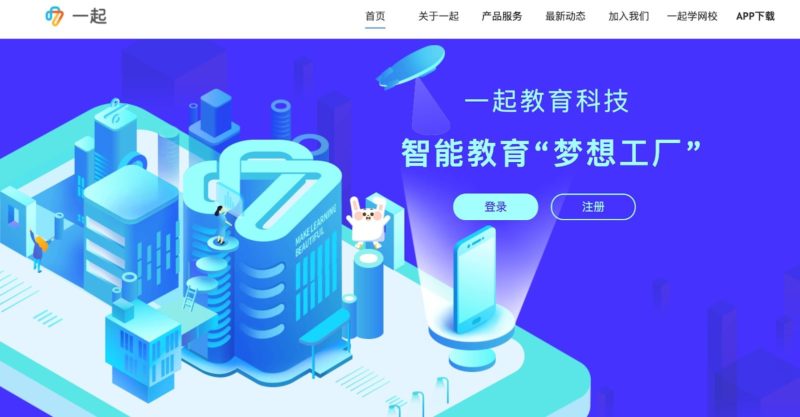
17zuoye, translating to “yi-qi-zuo-ye” or “homework together” widely recognized as the largest online educational platform in China. It is a three-party intelligent education platform for students, parents, and teachers. As of February 2018, 17zuoye has served over 60 million users and 120,000 schools by offering homework solutions to instructors, students, and parents. The platform aims to improve learning efficiency and efficacy and transform student homework from offline to online. In the same year, the company also raised over $250 million, and intends to expand into the middle school and high school sectors, and continue to lead the the educational technology market in China.
Their mission, state on their website, is to “make education a more beautiful experience” by “utilizing advanced education technology, quality educational content, and continuous educational enthusiasm” in order to “provide more efficient and beautiful products and experiences for K12 stage schools, families and social education scenes, opening a new era of intelligent education.”
VIPKid

Valued at $3 Billion in 2018, VIPKid is one of the hottest applications for online English tutoring in China. The company pairs English tutors from the United States or Canada with Chinese students for one-on-one English tutoring geared for children 4 to 15. Through a live video tutoring platform, parents can book a session for their children with tutors, who can upload videos of their lessons. The English teachers are considered hourly-paid independent contractors. Currently, VIPKid claims to have over 700,000 paying students and more than 80,000 registered teachers based in North America on the platform. The company also raised $500 in 2018, suggesting a wave of growth in the Chinese EdTech industry, and across Asia more broadly.
The app released followed their launch of the desktop version, and the app is a handy tool that lets students see previous feedback from teachers, upcoming schedules, and personal profile. Teachers can review their student sessions, a number of classes taught, and how minutes teaching completed. It also comes with a messaging area and notifications that can alert teachers and students of their upcoming tutoring sessions.
The platform rapidly took actions to support education in response to China’s school closures in late January due to the coronavirus outbreak. VIPKid’s first step was a launching 1.5 million free online math and English classes for children aged 4 to 12, and they prioritized students in Wuhan, the epicenter of the outbreak. They also launched free live-stream and recorded classes on eight major streaming platforms in China.
DaDaABC

DaDaABC has become one of the most successful intelligent English learning platforms for children in China. Founded in 2013, the company had earned over 15 awards and recognition in 2016. They’ve also collaborated with a number of top media companies in China, including Baidu, People’s Daily, and Tencent.
DaDaABC developed an English training system focused on one-and-one online tutoring while encouraging kids to have with their instructors during their practice. As an English tutoring platform, DaDaABC is often compared to VIPKid, but the company does not require their native English teachers to have a North American accent like VIPKid. As a partner of the American TESOL Institute (ATI), they also offer online training courses for aspiring English instructors worldwide.
Makeblock
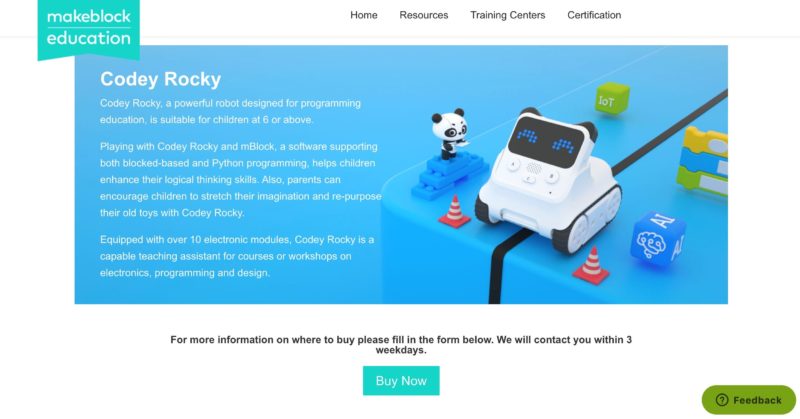
Makeblock is one of the most creative companies on our list. Founded just 6 years ago in 2013, the start-up uses Robotics as its primary educational tool, teaching kids coding, engineering, and other basic AI technologies. The package includes do-it-yourself robotic kits that will be manually assembled by students, who then also write simple lines of code to control their robots.
Makeblock is a global leader in STEAM education solutions (Science, Technology, Education, Arts, and Mathematics). The company provides hardware, software, content solutions, and even top-notch robotics competitions. Their products have over 8 million users worldwide, in over 140 countries, by over 1,600 channel providers. Makeblock has been the recipient of seven international awards, including the International Design and Excellence Award, the Reddot Design award, and the CES Innovation Awards in 2018.
As part of its global STEAM on Board Initiative for K-12 educators, Makeblock launched their “at-home resources” in March to adapt to online education with the pandemic. Initially designed to support local professional learning needs of STEAM and computer science teachers, the program now allows all educators and parents around the globe to teach and learn STEAM concepts with their free software, mBlock.
CCtalk
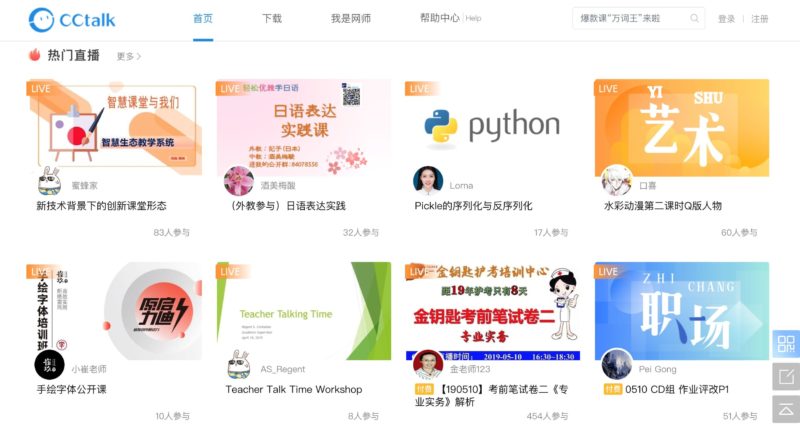
CCtalk is the multifaceted online learning platform for Hujiang EdTech, another leading company in the Chinese education market. Hujiang was founded in 2001, as a BBS (bulletin board service) community offering online courses, but has since then expanded to offering a wide range of online educational programs, including international and domestic exam prep, foreign language instruction, professional skills training, and even more. CCtalk is a real-time interactive education platform that provides independent knowledge educators and sharers with comprehensive online education tools and platform capabilities, providing informative content and a community environment for learning.
Contrary to popular thought, not every EdTech platform in China is solely based on English tutoring. CCtalk provides a variety of educational tools and abilities both in live, recorded, and group formats. The platform allows teachers to utilize and create educational widgets, including a two-way digital whiteboard, digital hand raising, a multiplayer video that guaranteed teacher-student synchronization, desktop sharing, live PPT-like courseware, and playback functions. CCtalk university provides training for their iteachers, and the CC talk platform itself serves as a great platform in helping teachers attract more new users, and increase revenue from their courses. The platform has been widely highlighted as a leader in educational innovation, allowing teachers to develop and utilize their own widgets and share them with others on the platform.
Changing Edu

Changing Edu is an O2O (online to offline) educational service app-maker connecting students, parents, and teachers to facilitate after-school learning services. Parents can post inquiries regarding tutoring services, and the mobile service app helps connect tutors to students. The Chinese EdTech company uses an online platform to make offline matches for one-on-one, at-home tutoring services. The company also plans to launch virtual, remote educational services, and other live streaming and expert Q&A services this year on their platform. The platform currently operates in 11 cities, including the larger cities of Shanghai, Beijing, Shenzhen, and Wuhan.
To accommodate for at-home learning during the coronavirus, Changing Edu launched a “Six-week learning contract” initiative for personalized one-on-one teaching. After the six-week learning period, students can apply for a full refund if they are dissatisfied. They also provided a free online teaching platform for self-employed teachers and smaller educational institutions in the industry. Among Chinese society, it seems that this platform has gained popularity among users after the outbreak.
Huikedu Group
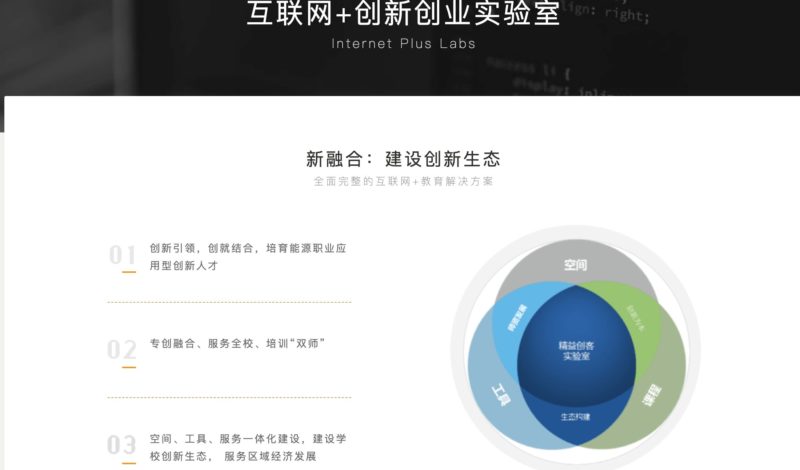
Founded in 2010, the Huikedu Group includes the “Huike Education Group” and the “Huike Science Research Institute.” They are the largest partner with higher institutions in China, offering cutting-edge educational technology and products to higher education and vocational education services. The group also cooperates with national goals to develop mobile internet, cloud computing, big data, internet marketing, and other innovative information technology into educational services.
Huideku has reached a unicorn valuation of $1billion. Its focuses are in partnering with enterprises to provide customized educational products. It has developed online courses and R&D labs on tops such as AI and robotics. Additionally, the group also partners with overseas schools to provide overseas educational programs such as exchange programs, language training, and career development.
Supporting at-home learning during the coronavirus pandemic, but what happens next?
The coronavirus outbreak has hampered the supply chain of many industries such as tourism, retail and much more. It could be said that the EdTech sector has been one of the “winners,” seeking opportunities to gain popularity in China in support of local education. Yuanfudao, VIPKid, Makebloc, and Changing Edu have made noticeable initiatives in response to enhance students’ at-home learning. Yuanfudao is one of the top online education apps with a weekly active user YOY growth of 21 times from February 2019 to February 2020. The education app leading the industry is Xuuersi, with a 50 times YOY growth. Its daily active users exceeded 10 million, with many new users from second, third, and fourth tier cities.
With the future uncertain, the most popular educational functions are short commitments, such as one-month subscriptions for a couple lessons or short interactive videos. However, doubt remains as to whether surge demand for EdTech fueled by quarantine measures will last. Schools will eventually reopen, and users are not guaranteed to stay permanently. Indeed, how people value and view the online education market has been revolutionized, yet the question of the longevity of these platforms remains.
Educational technology in China: Takeaways
Educational technology in China has not only seen tremendous growth in recent years but also shows no sign of slowing down in the booming education market in China. With these 8 being amongst the hundreds of EdTech start-ups across China, global markets should realize the innovative ways in which China utilizes digital tools to enhance students’ education in China. This phenomenon also stems from cultural factors, as Chinese society has always vigorously upheld education as one of its core cultural and social values. It is important to make a note of how China has integrated this value with the realm of technology and innovation, While tutoring applications remain the bulk of EdTech companies in China, our list has noted a number of creative EdTech start-ups that utilize a variety of online tools and out-of-the-box educational services. Western markets should be highly alert to the EdTech landscape in China, especially due to the large demand for foreign language tutors. This market is sure to see extended global communication, as language teaching and cross-border education become increasingly in demand with the enhancement of EdTech.
Author: Julia Qi
Make the new economic China Paradigm positive leverage for your business
Do not hesitate to reach out our project managers at dx@daxue-consulting.com to get all answers to your questions





